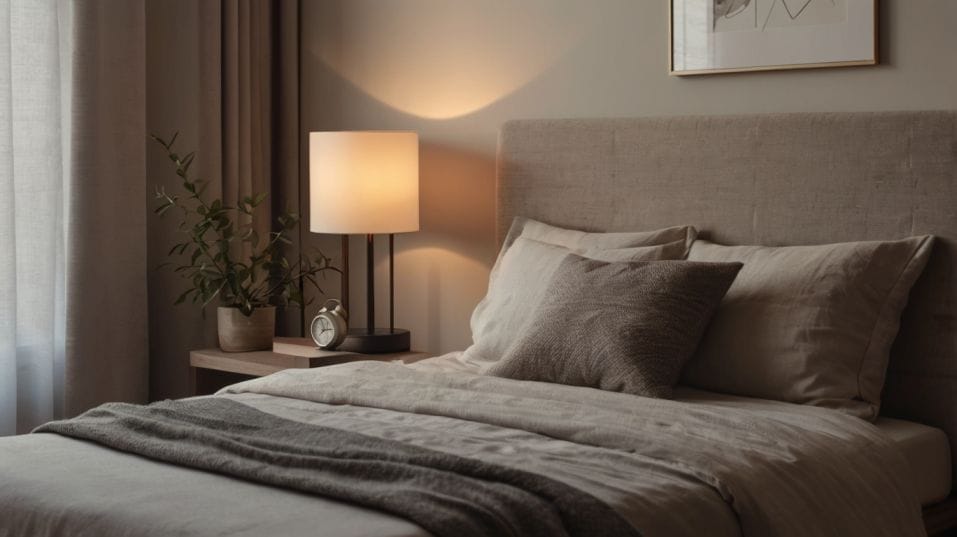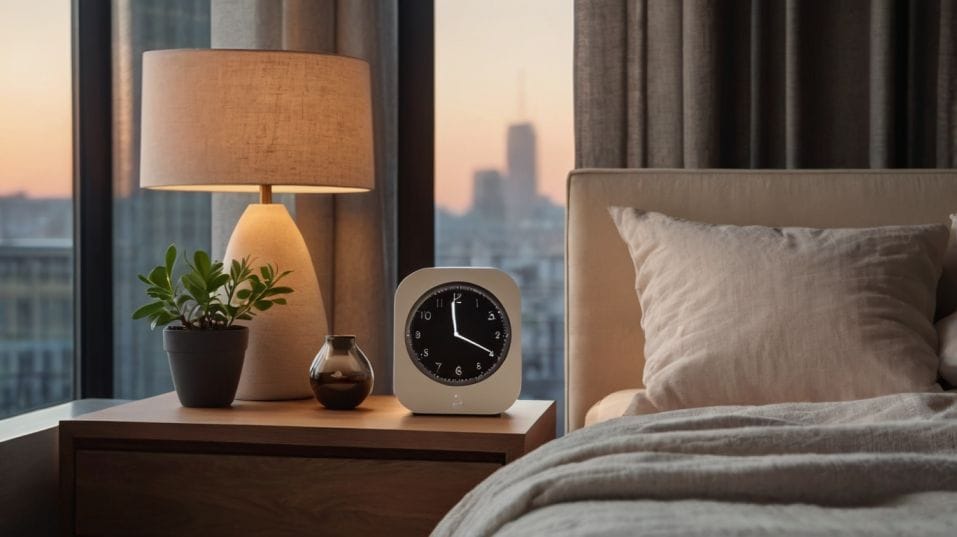The Smart Alarm Clock That Wakes You at the Right Time
Wake up feeling refreshed, not wrecked. Discover how smart alarms work with your body—not against it—for better mornings and better sleep.

What if your alarm didn’t just wake you—but knew exactly when to? If you’re just starting to improve your sleep, this one switch can change everything.
Smart alarm clocks sync with your natural rhythms, helping you wake up feeling sharp, not shattered. No more groggy mornings.
No more rude buzzes dragging you out of deep sleep. Just smoother starts, better energy, and real results—without changing your whole routine.
Why Traditional Alarms Are Wrecking Your Mornings
Standard alarms operate on one principle: loud noise at a set time.
Doesn’t matter if you’re in a dream, mid-REM, or buried deep in slow-wave sleep—they just blast you awake. That’s why you can sleep a full night and still wake up feeling like you were hit by a freight train.
Here’s the science: Sleep isn’t one flat state—it runs in cycles, typically 90 minutes each. You move from light sleep (stages 1 and 2), into deep sleep (stage 3), and then into REM (where dreams happen).
Deep sleep is critical for recovery, but it’s the worst time to wake up. Your body’s paralyzed, your brain waves are at their lowest frequency, and snapping out of it triggers a stress response. Heart rate spikes. Cortisol surges. It’s a rough landing.
Smart alarms sidestep this completely. They time your wake-up during lighter stages of sleep, when your brain is already climbing toward consciousness. It’s the difference between a rude awakening and one that feels—dare we say—natural.

How Smart Alarm Clocks Actually Work
Smart alarms use sensors and algorithms to monitor your sleep. Some track movement through accelerometers (in wearables or under-the-mattress pads). Others combine motion data with heart rate variability or even sound cues like breathing and snoring.
Here’s what happens: You set a target wake-up time—say, 7:00 AM—with a 30-minute window. The smart alarm watches for the optimal moment during that window, when you're in light sleep.
If that moment hits at 6:48, it wakes you then. If you're still deep at 6:59, it might wait until 7:02. It's not random—it’s strategic. It wakes you when your body’s ready.
Some smart alarms sync with sleep-tracking apps, allowing them to learn your patterns over time. That’s when things get really precise.
Your device doesn’t just guess—it knows your cycles. It predicts when your light sleep will hit based on your past nights. The longer you use it, the better it gets.
What This Actually Feels Like
Let’s talk about the real-world difference. Waking up from light sleep feels almost... easy. No fog. No dragging yourself to the shower.
No wondering why you're still tired. Your mind is clearer within minutes. Your body feels looser. Even your mood—less irritable, more focused.
This becomes even more noticeable when you stack it with other small sleep wins. A smart alarm won’t fix a broken sleep schedule, but it will multiply the benefits of a consistent one.
You start stringing together great mornings, and suddenly your workouts feel smoother, your focus sharper, your afternoons less sluggish. Smart alarms aren’t about perfection. They’re about momentum.
Making Smart Alarms Work Even Harder for You
The tech handles the timing—but you control the setup. For starters, consistency matters. Try to anchor your bedtime and wake-up window, even on weekends. The more predictable your rhythm, the more accurate your smart alarm becomes.
Optimize Your Environment
Cool room (around 65°F is the sweet spot). Minimal light—invest in blackout curtains or a sleep mask. Kill the blue light 30 minutes before bed if you can.
These changes amplify the quality of your cycles, giving the smart alarm more reliable data to work with.
Choose the Right Device
Choose the right device for you. Not everyone loves a wristband. If you’re sensitive to wearables, try a contactless sensor that slides under your mattress or even a smart lamp with integrated audio sensing.
What matters most is that you actually use it. Consistency beats complexity every time.
Don’t Obsess Over the Data
Don’t fall into the trap of overanalyzing your sleep stats. It’s easy to obsess over graphs and percentages.
Instead, track one simple thing: how you feel during the day. Are you alert in the morning? Recovering faster? Less caffeine-dependent? Then it’s working.
The Future of Waking Up
Smart alarms are already evolving. Some now use gradual light to simulate sunrise, helping your circadian rhythm align naturally.
Others integrate with your calendar or activity data to tweak wake windows based on your day’s demands.
Some even adjust based on your sleep debt—if your body needs more recovery, it’ll let you sleep a few extra minutes. That’s not just smart—it’s adaptive.
And the best part? You don’t have to change your whole life to see the benefits. You don’t need to meditate for an hour, ditch all tech, or train like a Navy SEAL. Just use a tool that wakes you up better. It's the low-hanging fruit of better health.
Final Thoughts
Better mornings aren’t about motivation or willpower. They’re about timing. And smart alarms give you that timing without making you work for it.
They align with your body instead of working against it. That means more energy, faster recovery, and a smoother start to every day.
You’re already thinking about your sleep. Now it’s time to act on it. Get a smart alarm. Set your window. Let it wake you when your body’s ready. Start tomorrow feeling like you actually slept.




